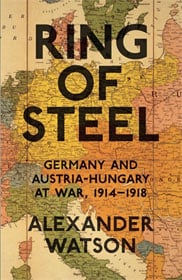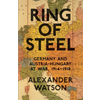This article is more than 1 year old
Weekend reads: Tales of Madchester in Chapter and Verse plus Shark and Ring of Steel
New Order guitarist’s kiss ’n’ tell and Will Self waxes lyrical
Ring Of Steel
It is said that history is written by its victors. Nowhere else is that more apparent than the First World War. So tired of the nauseating nostalgiafest that are the centenary celebrations here in the UK, sick to the eye teeth of Lord Kitchener giving me the finger and those amateur poets foundering in Flanders fields, I have been forced to defect to the opposition.
Alexander Watson has written a magisterial account about the war experience of the central powers. His description of the build up to war in the summer of 1914 is among the best I have read … and the most worrying. You can picture the whole scenario being repeated today, if say Vladimir Putin was assassinated by a Ukrainian.
The author deftly outlines the allegiances and motives of the major players, which contrast with the continent’s almost complete unpreparedness for war. He recounts the history of the disparate nationalities of the Austria-Hungarian empire and outlines the tensions and bad blood that soured the relations between them and led to the empire’s destruction.

This is not a book for the military strategist. It does deal with some of the major battles such as Verdun and The Brusilov Offensive, but if you want to know how Hindenburg won at Tannenberg, look elsewhere. Ring Of Steel concentrates more on logistics and, for instance, debunks the myth of “The miracle of the Marne” as being due to German overstretch, rather than Paris taxi drivers.
The author is particularly scathing when it comes to “the cult of victimhood” perpetrated by British historians of the Somme and outlines the story from not only the British and German perspectives, but also from the French who consistently outperformed their allies during the campaign.
This is a story recounted more from the home front, from the politicians to the ordinary people. The book is packed full of nuggets of information that you never hear in the victor’s tales.
There is a fascinating story of war paranoia from the early days, when it is rumoured that cars full of gold are passing through Germany from the French to the Russians to finance the forthcoming conflict. It sounds absurd, but 28 innocents were shot dead at impromptu roadblocks set up by the local populace.
Watson describes the co-opting of women and children into a “war of love” which is both cynical and touching – sending food and clothes' parcels and raising money for the cause is the early role of non-combatants in this total war, before they are expected to replace the men in the fields and munitions factories.
The demonising of the enemy and the increasingly vitriolic propaganda is recounted against a background of racial pogroms that presage the atrocities of the Second World War.
As the war continues and desperation and starvation mounts, there is a poignant recipe inscribed on a postcard: “Sunday Roast 1917. Take the meat ration card, coat it in the egg card and fry nicely until brown with the butter card. Steam the potato and vegetable card until pleasantly soft and thicken them with the flour card ... After the meal wash your hands with the soap card and dry them with the ration card.”
And a visit to a field brothel is recounted, which confirms exactly the Jaques Brel song: Next (Au Suivant).
If I have one criticism of this book, it is that it does tend to get lost in the detail. Alexander Watson has researched archives intensively, but there is a lack of cultural overview which could be supplied by reading contemporary writers such as Erich Maria Remarque, Karl Kraus, Robert Musil or Jaroslav Hasek, who are conspicuous in their absence.
The book also seems to cut off rather abruptly in November 1918, brief reference is made to the Versailles treaties, but the terrible consequences to the losers, the marauding Freikorps and crippling inflation is barely alluded to. But as the First and Second World Wars are increasingly being viewed by historians as a single conflict, I guess the cessation of hostilities is as good a place to finish as any.
Even so, this is an excellent work. Too many war histories are written by petty nationalists and cheap voyeurs and Watson is neither. This is quite simply the most interesting and enlightening history of the First World War that I have read. ®
 Author Alexander Watson
Author Alexander Watson
Title Ring of Steel
Publisher Allen Lane
Price £30 (Hardback)
More info Publication web site
